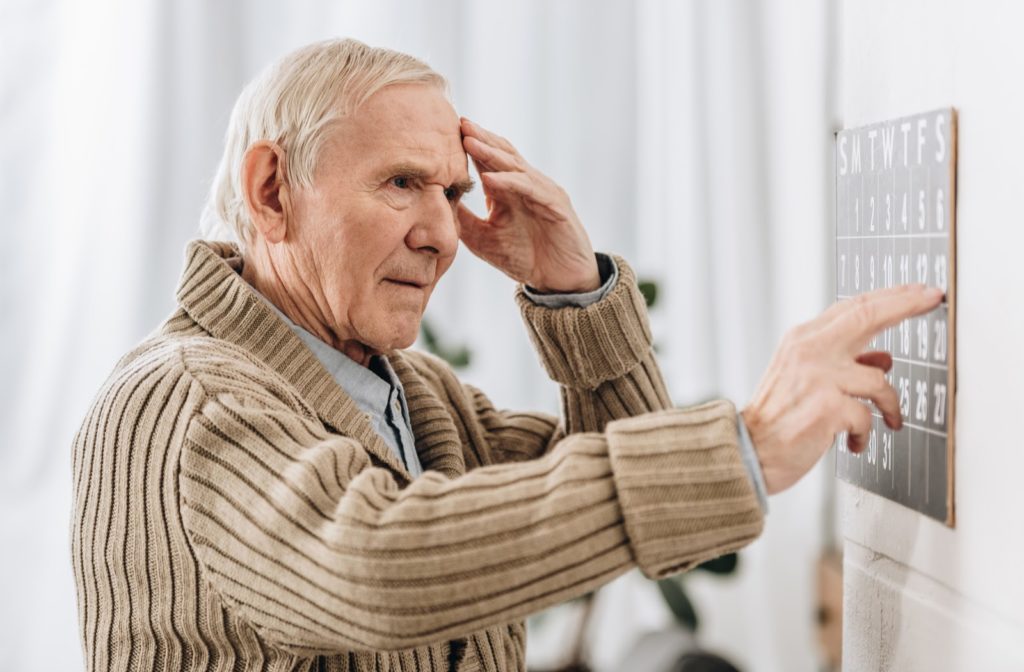Aging brings change, but plenty of it is normal. Older adults may need a little more help, but they can still live happy and healthy lives. Whether your loved one lives at home or in an assisted living community, you can help them take care of themselves as they transition into a new phase of life.
A lot changes with time, so how do you know what is considered “normal” aging? Continue reading to learn more about what is a normal part of aging and what isn’t.
What Is Normal Aging?
Our bodies constantly change as we transition through life, and you may feel like life is going even faster for your parents and grandparents. Your loved ones’ joints become stiffer, they get gray hairs and can be more tired than before, but they’re wiser and have a wealth of knowledge to provide.
Many fear aging, but growing older is a natural part of life. You can’t turn back the clock, but you can help take care of your loved one’s body and mind.
Learning about the changes your family member is going through can help you make sure they continue to live happily and healthily. Some normal aspects of aging include:
Your Body Changing
You may notice physical changes when your loved one ages. These can be visible changes like hair color or non-visible changes, such as higher blood pressure or stiff joints. If you notice any of the following, don’t worry, it’s a natural part of the aging process.
The Heart Needs to Work Harder
The blood vessels and arteries become stiffer as you age, making the heart work more to pump blood throughout the body. This can lead to high blood pressure, a threat to your loved one’s health and quality of life.
Adding exercise, like walking, running, swimming, or lifting weights into your loved one’s daily routine can help keep their blood pressure down. Eating a diet including whole grains, fruits, and vegetables can help keep their heart healthy.
The Skin Changes in Many Ways
You may not notice, but your loved one’s skin changes as they age. The skin produces less natural oil over time, there is less fatty tissue beneath the skin, and wrinkles, age spots, and skin tags are common.
Seniors should avoid hot water as it dries the skin out, so warm baths and showers are their best options. As your loved one ages, use sunscreen when outside, and keep an eye out for the sudden development of moles.
Moving is More Difficult
Muscle loss begins in our 30s and is known as age-related sarcopenia. This condition is faster and more noticeable in older adults and a factor in frailty and an increased risk of fractures and falls.
An active lifestyle can slow muscle loss and increase older adults’ activity levels. Physically inactive people can lose between 3 to 5% of their muscle mass each decade after 30. Maintain a healthy lifestyle, and your loved one can enjoy their mobility.
Your Senses Changing
Another common aspect of aging is the changing of your loved one’s senses. Our senses, especially hearing and seeing, weaken with age. Age-related hearing loss and tinnitus are common in older adults, and the structures within the ear begin to change.
The entire structure of the eye changes with age, so many older adults experience difficulty focusing on close-up objects, known as presbyopia. Age can increase the risk of several eye diseases, including:
Regular eye examinations and health checkups can help diagnose any issues and help protect your loved one’s health.
You Become More Forgetful
Everyone forgets things, but this happens more often with age. When a family member experiences memory loss, it can be easy to assume the worst, but forgetfulness is a normal part of aging. Names, intricate details, and multitasking may become harder, but older adults can still live their everyday lives.
Severe memory problems affect the ability to do everyday things. Staying mentally active, eating a healthy diet, socializing, and staying physically active can help keep your loved one’s mind sharp.
These are all aspects of normal aging, so don’t worry if your loved one is experiencing them. If they have abnormal experiences or struggle with their daily lives, it may be time to visit a doctor.

What Isn’t Normal Aging?
As we age, many natural changes occur to our bodies and minds, but some changes can negatively impact an older adult’s physical and mental health. Paying attention to sudden changes your loved one experiences can lower the risk of further complications.
Many age-related changes are normal, but consider visiting a doctor if your loved one is experiencing symptoms of:
Dementia
Dementia is the loss of cognitive functioning, including thinking, remembering, and reasoning to the point it interferes with daily living. Forgetfulness is common in older adults, but constantly losing items or having trouble holding conversations are signs of dementia.
Dementia can come in many forms, and Alzheimer’s disease is the most common for people over age 65. Book an appointment with your doctor if your loved one is showing any of the following symptoms:
- Getting lost in places they know well
- Asking the same questions repeatedly
- Having trouble understanding & following directions
- Becoming confused about time, people, & places
Chest Pain
Chest pain is a common sign of heart problems, don’t ignore it. Your loved one may experience stiffness, aches, or pains in their body, but visit your doctor if they experience any chest pain.
Breathing Difficulties
A sudden change in your loved one’s breathing abilities is not a normal part of aging. Moving around can take more effort, but if they’re suddenly out of breath when walking, book a doctor’s appointment right away. Breathing difficulties are associated with:
If your loved one experiences breathing difficulties, contact your doctor and book an appointment. Stay vigilant of their health and the changes you notice. If you can’t frequently see an older family member, senior living communities can provide consistent support for their various needs.
Stay Happy & Healthy With Age
Age brings many changes, and your loved one may not be ready for all of them. Knowing what to expect can help them live healthy and fulfilling lives as they transition into a new phase of life. If you’re looking for a way to provide your loved one with consistent care as they grow older, contact a senior living community near you.



